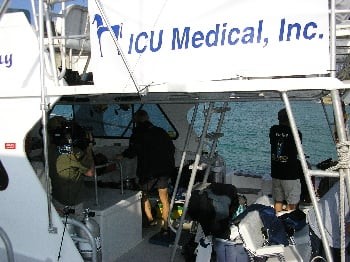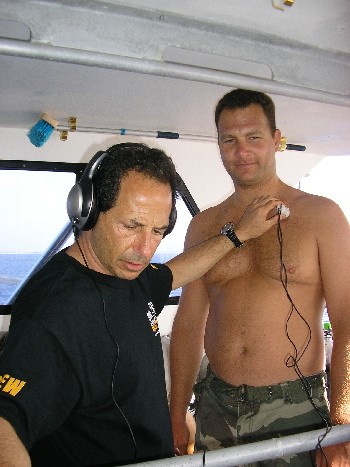Kirk Krack has always placed a heavy emphasis on understanding the freediver’s most important piece of equipment. It isn’t sold by dive shops, or even by Deeper Blue’s online Shop, but one cannot dive without it and, in fact, it’s the only piece of gear one needs. Improvements and upgrades are sometimes available for varying outlays of cash, along with the time and effort required to implement them.
The human body has, of course, been studied inside and out since the beginning of, well, human bodies, and few who are reading these lines lack appreciation of the state of the medical art and progress in the related sciences and technologies. If we know of an event, process or state in the body of a living human being, more than likely we can measure it with terrific precision and even see it – often in real time and non-invasively. Be that as it may, when Kirk launched his career as a pioneering freediver, he quickly found out that pioneers don’t get a lot of help from road maps or signs. That’s how come they’re pioneers. The same medical and scientific culture which could replace the heart of a living person had precious little to say about apnea diving, and much of what it did have to say was at odds with Kirk’s experience and observations, and with the lore passed down to him by his own guides such as Pipin.
As Kirk’s Performance Freediving initiative developed he made heavy and ongoing investments in science, which in the context of a struggling and often impoverished enterprise was nothing less than visionary. It takes a lot of belief and no small courage for a struggling entrepreneur, one often lodging on students’ and colleagues’ sofas, to sink time and money into projects which have no immediate prospect of an economic payoff. Kirk’s own curiosity, the same unquenchable thirst for exploration and adventure which took him from the Saskatchewan prairie to a global oceaneering career, is certainly part of it but more importantly he understood from the beginning that there’s a vital symbiosis between freediving’s vitality as a recreational and competitive sport, on the one hand, and the empty shelf he’d discovered in the great Library of Science.
Freediving needed science, and science needed freediving.
A goodly number of physicians and scientific researchers have, over the years, passed through the Performance Freediving world as clinic students, each adding new knowledge to Kirk’s growing database but also taking away observations that have fueled new academic research and analysis.
An early institutional partnership struck with Simon Fraser University in Vancouver, BC, continues with a regular program of activities, measurements, analysis and reporting.

It’s probably no coincidence that the Performance Freediving Team’s newest member is a physician and an inventor of medical devices. Dr. George ‘Doc’ Lopez, 58, is a US National record holder in the Free Immersion discipline and Founder/CEO of ICU Medical, Inc. Doc Lopez is a walking example of the synergistic effects of Kirk’s accumulated field research and his own medical background.
More recently, a distinguished pulmonologist from the Cedars-SinaiMedicalCenter in Los Angeles, Dr. Ralph Potkin, has been working with Performance Freediving to formulate a program of freediving-related research. Dr. Potkin is no neophyte to dive medicine – he’s been an active scuba diver since 1971 and his dived all over the world including in Antarctica. He’s made hyperbaric medicine his primary specialty for the past ten years, in association with The Beverly Hills Center for Hyperbaric Medicine. Dr. Potkin, an alumnus of the Performance Freediving clinics, resided with the team during the train-up for the Sink Faze Cayman 2006 World Record event and recorded considerable pre- and post-dive physiologicals from team and support freedivers.
Dr. Potkin’s scientific interest in freediving has roots in earlier study of decompression sickness in marine mammals. The finding that whales, seals and dolphins can indeed suffer DCS prompted him to wonder about the vulnerabilities of human freedivers. His current work is in the nature of a pilot study, the intent of which is to develop a basis for a formal research program.
Dr. Potkin wants to explore three basic research issues, the first of which is whether, indeed, the phenomena associated with DCS can be observed in freedivers.

The measurement technologies are quite well developed and have served well in the field of scuba diving but to date have not been applied to systematic data collection in freediving. The basic tool here is Doppler bubble detection – a small, rugged device non-invasively detects bubbles in the blood vessels as the nitrogen dissolved into tissues under hydrostatic pressure (at depth) expands under ambient surface air pressure.
Ancillary questions address the frequency with which significant nitrogen absorption occurs during freediving, the depth, time and other factors associated with incidence, and, as a practical matter, mitigation.
Dr. Potkin disclosed that he has found bubble formation in some freedivers in measurements taken shortly after diving. He’s understandably reluctant to be more specific at this early juncture, but it’s fair to say that his findings on Grand Cayman favor moving forward with the research.
A second broad area of research underway centers on the issue of long-term neurological effects of freediving. This is, of course, a hot-button item with the general public and more than a few freedivers themselves. Who hasn’t had a non-diving friend or relative declare that holding one’s breath deprives the brain of oxygen and leads to certain neurological damage ?
It’s one of those things that ‘everybody knows’, but which turns out to be not exactly so. The evidence for the protective effects of the mammalian dive reflex under apnea – diversion of blood to the most vital organs, bradycardia and so forth – is strong and is, as Dr.Potkin reminds us, surprising to the conventional medical wisdom.
Having learned of a theretofore unknown homeostatic mechanism which seems to allow for some degree of apnea without harmful consequence, Dr. Potkin argues for asking the question at the margins. It may be that a seemingly innocuous activity, one ‘provided for’ by human physiological response, has consequences which become apparent only over time. Or, it may be that there are immediate limits to the adaptation afforded by the diver reflex: limitations of depth, time, frequency, other factors or combinations of factors.
Dr. Potkin is addressing the neurological issue with a preliminary program of brain imaging, focused on subjects who have a history of over 5,000 deep apnea dives.
The phenomenon we colloquially term ‘squeeze’ is the third major area Dr.Potkin is interested in, with etiology (i.e., causes) and prophylaxis (prevention) as his immediate medical concerns. He is, after all, a chest doctor. He’s taken spirometry data from the Performance Freediving team members and support freedivers during the Sink Faze trainup and collected anecdotal data from as many freedivers as he could. Here, too, it is premature to report anything in the nature of a finding. There is this, though: Dr. Potkin has observed very significant increases in lung volume following the common freediving practice of ‘packing’. Common knowledge, you say ? Duh ? Not so – Dr. Potkin assures us that the medical community would poppycock the notion that human lung volume can be increased from a non-pathological baseline by any known intervention. You do it, but just so you know: it can’t be done.
Well, it wasn’t so long ago that medicine’s conventional wisdom assured us that no human being could freedive below 30 meters /100 feet and survive. Freediving and medical science have, it turns out, a lot to offer one another.
The medical community has been surprised by previously unknown adaptive responses in human apnea divers, homeostatic programming which, as we in the community know, enables us to dive far deeper and longer than traditionally thought possible.
Dr. Potkin points out another surprise – the common knowledge ( in the freediving community) that the dive reflex is conditioned. Learned, and teach-able, too. Kirk Krack has shown ( over hundreds of clinic students) that ‘naïve’ (i.e., completely inexperienced) students can quickly be trained to accomplish breath-holds that only a few years ago were the province of the sport’s elite.
Dr. Potkin’s three research interests address areas of considerable practical concern for freedivers. DCS used to be thought of as an issue for scuba divers, but Dr. Potkin’s Doppler measurements have made it clear that there is a real though (as yet) unquantified exposure for apnea divers as well. As performance parameters increase and more freedivers dive deeper and longer this issue will very likely become of greater concern to more people. No one can regard the prospect of neurological damage with equanimity – we need to know more, and the sooner the better. Finally, chest squeeze is a problem which has put a goodly number of our friends and colleagues out of the freediving business temporarily or, in some cases, permanently. Dr. Potkin sees the state of our knowledge in this area as primitive. He concedes there is no decisive evidence for the origin of the blood components seen in freedivers’ sputum from time to time. If there are ways to prevent or mitigate this class of barotrauma, it were better we knew and practiced them
Kirk Krack’s prescience and dedication are bearing fruit. Still the pioneer, Kirk has already implemented a Potkin innovation into the Performance Freediving Team’s training and competition paradigm. Team athletes now follow up deep dives with a return to a recovery station hung at about 3 meters’ depth, where a few minutes’ breathing pure oxygen are a possible prophylaxis for DCS. It isn’t a fully-vetted procedure for apnea divers, but the likely benefit and negligible downside make an offer an entrepreneur can’t refuse.
Dr. Ralph Potkin will soon be asking the help of the entire Deeper Blue readership in gathering data on the freediving medical issues discussed here.
There’s More!
Read more Daily Updates from Paul in our Sink Faze 2006 Special Feature Series and check out the Photo Gallery. Video and daily team updates at the Sink Faze website.
